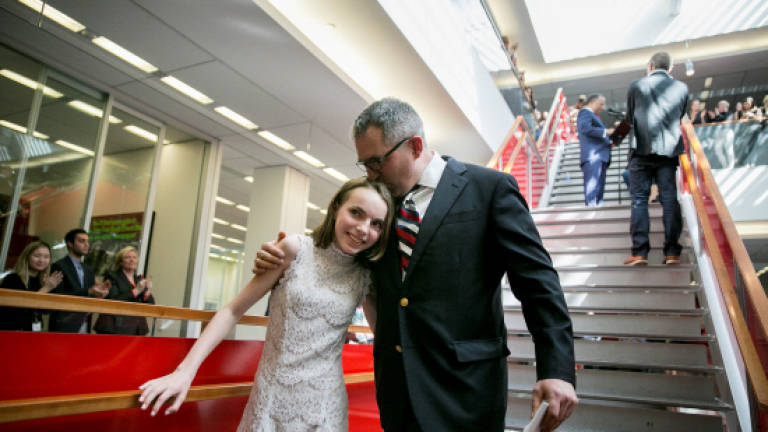Pulitzer Prizes honour US election coverage



NEW YORK: The Pulitzer Prizes, the most prestigious awards in US journalism, on Monday honoured work that challenged President Donald Trump during the country's divisive election campaign and delivered a passionate defence of a free press.
The 101th edition of the awards, announced at Columbia University in New York, came with the US news media under asault from the White House for peddling "fake news" critical of the administration, and after the press took a bashing for failure to predict Trump's election.
David Fahrenthold of The Washington Post won the national reporting award for what the board called "a model for transparent journalism" that cast doubt on Trump's assertions of charitable generosity.
Fahrenthold investigated not only Trump's claims of charitable giving but also disclosed that the Republican presidential candidate had boasted in crude terms about groping women in a 2005 videotape.
While on the campaign trail seeking the Republican nomination, Trump said he had raised US$6 million (RM26 million) for veterans, but stopped distributing the money having given out just a little more than US$1 million.
Journalism during the campaign was also honoured with the Pulitzer for commentary going to Peggy Noonan of The Wall Street Journal for what the board called "beautifully rendered columns that connected readers to the shared virtues of Americans during one of the nation's most divisive political campaigns".
The coveted Public Service medal went to tabloid the New York Daily News and investigative news site ProPublica for uncovering official abuse of eviction rules that ousted hundreds of mostly poor minorities from their homes.
There were a total of 21 categories in journalism, arts and letters.
Cornerstone of democracy
"The prizes represent the core values of two realms: independent inquiry into public affairs, and creativity and scholarship in telling the story of America," said Pulitzers administrator Mike Pride.
In his introduction he said the winning journalism included reporting that challenges "powerful politicians and institutions" and exposed "systematic abuse of people with little hope of defending themselves".
The New York Times won the international reporting award for "agenda-setting" coverage of Vladimir Putin's efforts to project Russian power abroad, including assassinations and online harassment.
Russian attempts to sway the US election in favour of Trump are the object of an investigation by lawmakers in the US Congress.
Freelance photographer Daniel Berehulak won for breaking news photography for images published in The New York Times illustrating the Philippines' war on drugs.
Pride challenged perceived wisdom that newspapers are in decline, hard hit by falling readership and advertising revenue, saying US reporting was in the midst of a digital-age revolution.
"Because journalists deliver uncomfortable truths they will always be easy targets for criticism," Pride said. "But you only have to pause to consider societies where journalism is suppressed to realise even with its flaws, a vigorous free press remains a cornerstone of democracy. It is truly an ally of the American people," he added.
"I'm not going to offer any kind of opinion about the political scene other than that to say that journalists just need to keep plugging and keep doing what they're doing," Pride later told reporters.
Violence, prisons, slavery
Other domestic US awards went to the East Bay Times of Oakland, California for breaking news, for covering a warehouse party fire that killed 36 people and exposing failures that might have prevented it.
The New York Times' C.J. Chivers won the feature writing award for showing a Marine's postwar descent into violence.
The Chicago Tribune won the Pulitzer for feature photography for portraying a 10-year-old boy who survived a shooting and his mother.
The Charleston Gazette-Mail won the investigative reporting award for coverage of opioids in West Virginia.
The International Consortium of Investigative Journalists, McClatchy and the Miami Herald won the explanatory award for an investigative series on the Panama Papers, exposing the global extent of offshore tax havens.
The Salt Lake Tribune won for local reporting for exposing cruel treatment meted out to sexual assault victims at Brigham Young University in Utah.
The Pulitzer for fiction went to Colson Whitehead for slavery novel The Underground Railroad. Heather Ann Thompson won in the history category for History Blood in the Water: The Attica Prison Uprising of 1971 and Its Legacy.
The award for biography went to New York-born Libyan writer Hisham Matar for The Return: Fathers, Sons and the Land in Between. — AFP